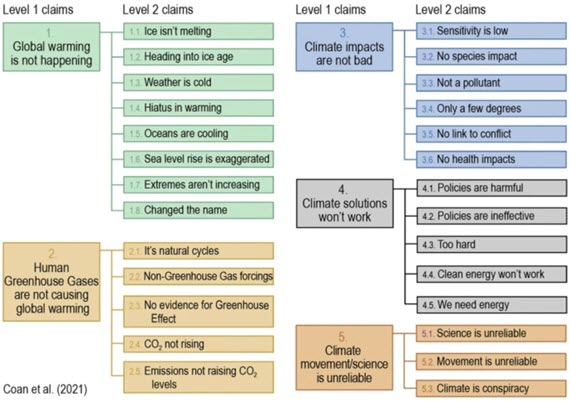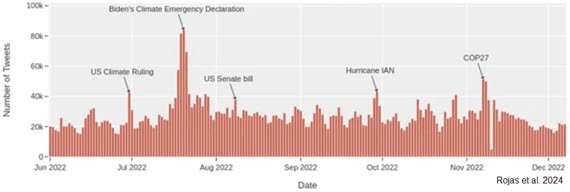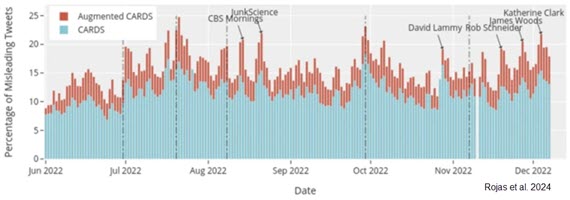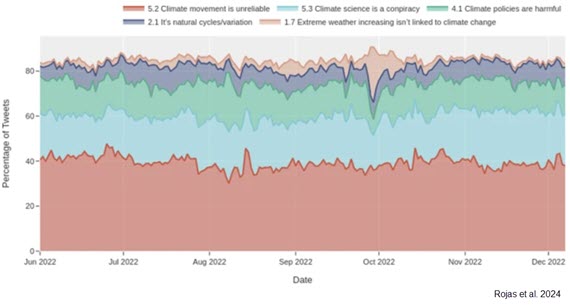New paper about detecting climate misinformation on Twitter/X
Posted on 2 September 2024 by John Cook
Together with Cristian Rojas, Frank Algra-Maschio, Mark Andrejevic, Travis Coan, and Yuan-Fang Li, I just published a paper in Nature Communications Earth & Environment where we use the Computer Assisted Recognition of Denial and Skepticism (CARDS) machine learning model to detect climate misinformation in 5 million climate tweets. We find over half of climate misinformation tweets involve personal attacks or conspiracy theories. This new paper builds on work published in 2021 which I wrote about in the article How machine learning holds a key to combating misinformation.
Here is the abstract of our open access paper "Hierarchical machine learning models can identify stimuli of climate change misinformation on social media":
Misinformation about climate change poses a substantial threat to societal well-being, prompting the urgent need for effective mitigation strategies. However, the rapid proliferation of online misinformation on social media platforms outpaces the ability of fact-checkers to debunk false claims. Automated detection of climate change misinformation offers a promising solution. In this study, we address this gap by developing a two-step hierarchical model. The Augmented Computer Assisted Recognition of Denial and Skepticism (CARDS) model is specifically designed for categorising climate claims on Twitter. Furthermore, we apply the Augmented CARDS model to five million climate-themed tweets over a six-month period in 2022. We find that over half of contrarian climate claims on Twitter involve attacks on climate actors. Spikes in climate contrarianism coincide with one of four stimuli: political events, natural events, contrarian influencers, or convinced influencers. Implications for automated responses to climate misinformation are discussed.
We used the taxonomy from Coan et al. (2021) where we developed the CARDS model for detecting misinformation claims. There are 5 categories of misinformation: it's not real, it's not us, it's not bad, solutions won't work, experts aren't reliable:
This taxonomy provides a comprehensive overview of the frequently employed main claim and its corresponding subarguments utilized to bolster contrarian perspectives on climate change. Source: Coan et al. (2021)
We found that spikes in climate misinformation coincided with external events - usually political events like climate legislation going through Congress or a COP summit, but also extreme weather events like Hurricane Ian.
Number of tweets related to climate change published during the second semester of 2022.
We also found misinformation spikes instigated by influencers, both contrarian influencers promoting misinformation & convinced influencers who provoked misinformation backlash. I have to confess, I never thought I'd coauthor a climate misinformation paper mentioning @RobSchneider and @RealJamesWoods!
Percentage of contrarian tweets detected by the CARDS and Augmented CARDS models.
The major take-home from this research is that 40% of climate misinformation tweets are ad hominem attacks and 20% are conspiracy theories. The majority of climate misinformation involves discrediting climate actors and eroding public trust in climate science.
Breakdown of the five most relevant categories detected by the Augmented CARDS model on Twitter in 2022. The percentages of these categories are relative to the total proportion of contrarian claims identified by the binary model.
Reference:
Rojas, C., Algra-Maschio, F., Andrejevic, M. et al. Hierarchical machine learning models can identify stimuli of climate change misinformation on social media. Commun Earth Environ 5, 436 (2024). https://doi.org/10.1038/s43247-024-01573-7































 Arguments
Arguments


































It appears [Snipped] the authors would be exellent candidates to be the founding and governing directors of the Ministry Of Truth.
[BL} It appears that you have unfinished business on a thread where you commented two weeks ago.
Participation in the comments threads at SkS requires that you engage in legitimate, constructive dialog with other participants. You are violating the sloganeering section of the Comments Policy, which states:
On the previous thread, you made unsupported assertions that have been refuted by other comments. You have provided no response to any of that material. You will not be allowed to start a new thread of unsupported assertions until you go back to that thread and respond to your critics. Suitable responses could include:
Until you return to that thread and engage in honest discussion, any further comments you post on any other thread will be deleted.
Please note that posting comments here at SkS is a privilege, not a right. This privilege can be rescinded if the posting individual treats adherence to the Comments Policy as optional, rather than the mandatory condition of participating in this online forum.
Please take the time to review the policy and ensure future comments are in full compliance with it. Thanks for your understanding and compliance in this matter.
Rapid identification and correction of on-line presentations of misunderstanding is indeed an important pursuit, and not just misunderstanding regarding climate science and climate change. It is a critical part of the leadership actions required to limit the harm done by people who desire more “freedom to believe and do whatever they want”. And it is very important to limit the harm done by undeserving status/influence winners like Elon Musk.
The following quote from the new paper points out the Musk Twitter/X challenge for collective leadership actions attempting to limit the damage done by misunderstandings caused by the production and promotion of misinformation and disinformation.
These findings have practical implications. Adopting our model could help Twitter/X to augment and enhance ongoing manual fact-checking procedures by offering a computer-assisted procedure for finding the tweets most likely to contain climate misinformation. This adoption could make finding and responding to climate-related misinformation more efficient and help Twitter/X enforce policies to reduce false or misleading claims on the platform. Yet environmental groups have shown that Twitter/X ranks dead last among major social media platforms in its policies and procedures for responding to climate misinformation and there is little evidence that X will improve these procedures in the near term41. Alternatively, our model could provide the basis for an API that Twitter/X users could employ to assess climate-related claims they are seeing in their feeds. Overall, the potential practical applications of our model underscores the need for continued academic work to monitor misinformation on Twitter/X and raises important questions on the data needed to hold social media platforms accountable for the spread of false claims.
The last sentence underscores the challenge of limiting the harm done by undeserving higher status/influence winners like Musk. The following PBS item about X in Brazil highlights the challenge of “hold(ing) social media platforms accountable for the spread of false claims.”
PBS - Brazilian judge suspends Musk’s X platform for refusing to name a legal representative.